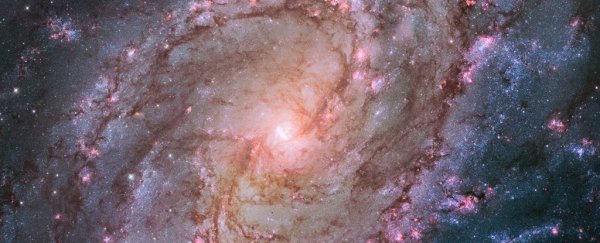Science is not quite sure why, but new calculations show the Universe is expanding faster than expected, possibly the result of something we only suspect exists – dark radiation.
The latest research on star movements found the Universe is expanding between 5 percent and 9 percent faster than early in its life. One consequence of this could be that the universe ends up ripping itself apart.
"A funny universe just got funnier," says lead Australian researcher and ANU astrophysicist Brad Tucker.
"It could be a new force similar to dark energy, or a new particle, or it could be that dark energy itself has changed over time," he added. "We thought we were close to understanding dark energy, but now we know we don't know the answer at all. There's a lot of work to do."
Stars, planets, and gas make up only 5 percent of the Universe. The rest is 25 percent dark matter and 70 percent dark energy, both of which are invisible and have never been directly detected.
Precise values of the Universe's expansion from 13.7 billion years ago have been calculated from observations of the cosmic microwave background, the very faint afterglow of the big bang.
The research was led by Nobel Laureate Adam Riess of the Space Telescope Science Institute and the Johns Hopkins University in the US.
The Hubble Space telescope was used to look at variable stars, called Cepheids, and Type Ia supernovae, which both have well known brightness which enables their distance to be precisely determined.
The team measured the movements of about 2,400 Cepheid stars and about 300 Type Ia supernovae over two and a half years.
From these measurements they calculated the Universe's expansion rate, known as the Hubble constant, to be 73.2 kilometres per second per megaparsec (a megaparsec equals 3.26 million light-years).
The new value means the distance between cosmic objects will double in another 9.8 billion years.
The research is published in The Astrophysical Journal.
The team has a number of theories for the Universe's excessive speed. One possibility is that dark energy may be shoving galaxies away from each other with growing strength, termed phantom dark energy.
Another idea is that the cosmos contained a new subatomic particle in its early history that travelled close to the speed of light and affected the expansion rate. Such speedy particles are collectively referred to as dark radiation and include previously known particles such as neutrinos.
The boost in acceleration could also mean that dark matter possesses some weird, unexpected characteristics. Or the speedier Universe may be telling astronomers that Einstein's theory of gravity is incomplete.
Although unlikely to affect humanity's near future, Tucker says the different scenarios could have serious repercussions for the Universe.
"If the acceleration is not too fast, the Universe will cool as it flies apart, resulting in a big freeze," he says. "But if the Universe can't keep up with its own acceleration there will be a big rip. The Universe will literally rip itself apart, which would be awesome."
This article was originally published by Business Insider.
More from Business Insider:
